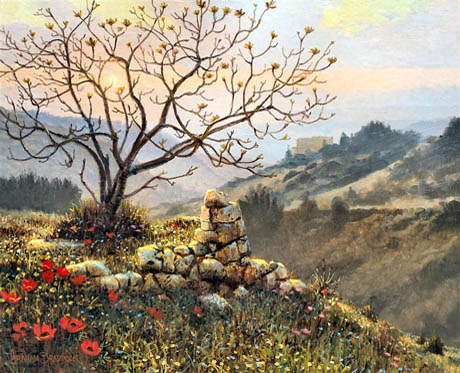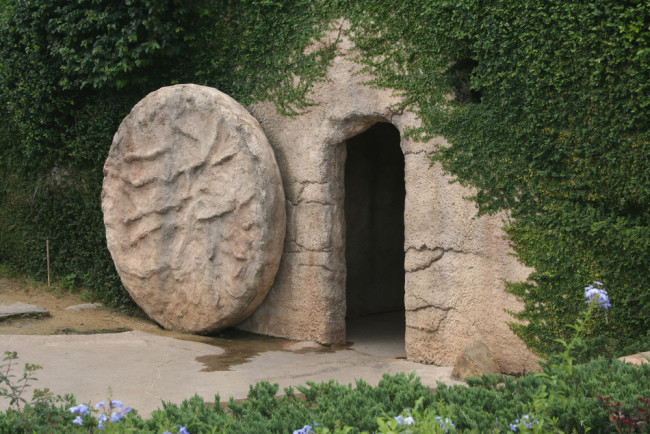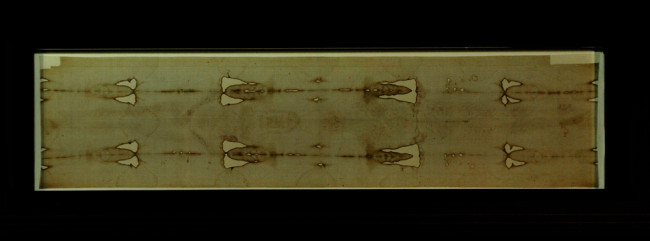Lent is not about giving up chocolate. It’s about uncovering the blindness in our perception and being open to what others have to share with us.
But now that we’re halfway through the season of Lent, I think it’s the right time to talk about what is possibly the most important spiritual practice of all, the practice that makes all the others possible: the spiritual practice of letting something go. All the spiritual teachings in the world are not going to help us–even a personal invitation from the spiritual master himself is not going to help us–if we keep ourselves too busy to show up for him. Thanks for coming over, Martha says to Jesus this morning. But you know, I really don’t have time for this stuff!
“Mindfulness is "paying attention in a particular way: on purpose, in the present moment, and non-judgmentally." ... It could have been at the mouth of one of the shallow caves carved by Nature out of the limestone cliffs of Mount Quarantania, facing Jericho on the Jordan River and the Dead Sea to the southeast, that Jesus sat to gaze at forty dawns in the wilderness before he began his ministry. This 40-day season of Lent invites us to join Jesus in practicing mindfulness as he did in the desert.
O God, our Divine Parent, may your presence be ever revered. May your peace and justice dwell among us. May your love and compassion live within and between us. Nourish us daily with the necessities of life; sustenance for our bodies, and inspiration for our spirits.
Compassion over rules
sadly in a world dominated by might, money, and power, some people look upon compassion, mercy, gentleness of spirit, inclusiveness and unconditional love as weakness. In a world blighted by terrorism, war and indescribable brutality demonstrated day by day, for example in Syria, Iraq and Afghanistan; in a world where many have become indifferent, self righteous and just downright selfish; in a world where Bible passages are taken out of context to uphold racism, sexism, homophobia and unhealthy nationalism: these are the places in which compassion, mercy, gentleness of spirit, inclusiveness and unconditional love should work and speak.
As Christian people we all too often pay lip service to the fact that the political and religious context in which Jesus lived, thought and died, was one of economic, political and military domination by the Roman Empire. We also often fail to realise that this was also both the context in which the Christian scriptures were written and the life and death of Jesus was interpreted. Failure to understand these Jewish contexts leads Christians and the Church to misinterpret the underlying message and meaning of the life and death of Jesus the Jew of Nazareth. Whether we like it or not, I am convinced that Jesus had a political agenda as well as an agenda of compassion.
These parables of the lost and found are outrageous. None of us would get very fare in life if we lived by these teachings. It is better to put the welfare of the many above the needs of one. It is pointless to cry over spilt milk. Sometimes its better to cut your losses and move on. The best accountants learn quickly to write off losses that would be too time consuming and costly to recoup. Children need to learn that they can’t always get what they want; that there are consequences to their actions, that dues must be paid, that we need to ask for forgiveness and make amends for our crimes, that rules need to be followed, and laws cannot be broken. That doing the right thing will be rewarded. And yet along comes Jesus, spouting such foolishness that even we who are predisposed to agree with him, even we can sympathize with the self-righteous and wonder how anyone could be expected to live like this.
As we prepare for Easter, this Season of Lent offers us an opportunity to reflect again upon how we experience Yahweh God and how we live our lives of servant hood - not as doormats to be trampled under foot but as true servants of Yahweh God who proclaim by our lives that Jesus is our Way, our Truth and our Life. Lent offers us the opportunity NOT to give up but to give more of ourselves in the service of others and in the causes of justice and peace. May this Season of Lent have real meaning for each one of us.
"Jesus matters for Christians because he was for us the decisive disclosure of God." | "The notion of Jesus' death as a substitute for our sins was not found in the first 1000 years of Christianity." Just two quotes from an extraordinary "Lent Event" Forum with Jesus scholar Marcus Borg.
(This is adapted from emails I sent to students, faculty, and staff in the course on mindfulness I'm teaching at the USC Keck
From the Festive Worship collection
There is no Easter without making one’s peace with the dead and with the forces of destruction that lurk within the human psyche.
From the Festive Worship collection
When love and hatred engage in mortal conflict it is love which suffers most; but love has the final victory.
"... remain here, and stay awake with me." Jesus, Matthew 26: 38 One night of our dog's life lasted for just a few
Loving kindness is the cultivation of benevolence toward all living beings, love without clinging, and a strong wish for the happiness of others. It is the kind of love that often bubbles up freely in the heart of a mother for her child. It is a love that is independent of expecting or needing anything in return.
When someone shares in our suffering, somehow the knowledge that we are not alone, that there is someone out there who knows the pain that we are going through, the knowledge that we are cared for by someone who truly knows our pain comforts us and gives us the strength we need to endure our suffering. To be alone in our suffering is the most terrible thing that we can imagine. The Good News that God is LOVE means that LOVE will not let us suffer alone because LOVE is determined to suffer with us. Working in, with, and through those who have experienced our pain LOVE is able to enfold us and say, “I know, my child, I know.”
From the Festive Worship collection
THEME The Connecting Solitude THOUGHTS FOR REFLECTION The spiritual desert is not a foe to be conquered but an emptiness to be affirmed: for when we are full, we perceive nothing, but when we are empty we can receive everything.
From the Boundless Life collection
“Weep not, weep not for me* Daughters of Israel's womb; Weep for yourselves", said Christ "Not for my cross or tomb".
Structured for Lent, but practical for any time of the year, this new resource examines the lament psalms for their connections to contemporary experiences. The introduction acquaints the reader with Dr. Walter Brueggemann's analysis of the psalms into the categories of orientation, disorientation, and reorientation. A contemporary psalm/poem for each entry discerns the emotional tenor of the psalms and makes it relevant for the challenges of contemporary life and relationships.
I thought I'd pretty well covered the territory in a "musing" I wrote a few years ago called "The Varieties of God", a listing of the many alternatives along the spectrum between traditional theism and atheism. But Ryan Bell has added a new one: provisional atheism. Godlessness for the time being. He's gone public with this status, and I intend to follow his "Year Without God" blog to see how it goes for him.
Being a child of God – for Jesus and for the rest of us – is a poetic way of describing our direct, personal engagement with Ultimate Reality. It is an artful expression of ourselves as physically integrated with the divine essence of the cosmos. Being the son or daughter of God does not mean that any of us can leap off the cross in a single bound.
The dry bones raised by Ezekiel are a metaphor for those who died in the service of God’s justice: those who died working to restore God’s distributive justice-compassion to God’s Earth, and who themselves never saw the transformation. The army of dry bones is an army exiled from justice. Fairness demands that if Jesus was resurrected into an Earth transformed into God’s realm of justice-compassion, then all the other martyrs who died too soon should also be raised with him. “But in fact,” Paul writes in 1 Corinthians 15:20, “Christ has been raised from the dead, the first fruits of those who have died.” It is the Christ – the transformed and transfigured post-Easter Jesus – who has started that general resurrection, which restores justice-compassion to a transformed Earth. The transformation has begun with Jesus, and continues with you and me – IF we sign on to the program.
Presider: God be with you. People: And also with you. Presider: Open your hearts. People: We open our hearts to God.
A Journey of Faith: Moving On
A growing number of progressive Christians, for a decade or more, have seen themselves less and less of being a theist, that is as one who believes in a 'God out there' who intervenes with and over rules the laws of nature. Yet many of these are still very happy to use the words Father, Son and Holy Spirit. This Trinitarian descriptor expresses the way in which Christians may encounter or interpret our 'God', but 'God' is much more. For many progressive Christians, the Trinity is an expression of different people and communities living in perfect harmony. Now that really is heaven on earth!
I’d like to invite you into a conversation we’ve been having at the First Presbyterian Church of San Rafael these last weeks of Lent, a conversation about evolution and faith. We’re not talking about a six day creation, with God resting on the seventh. I really, really hope that argument’s over and done with. No, we’re talking about evolution as the way in which everything unfolds in all of creation. We are looking at a creation that evolves and opens towards unity, or shalom, in the presence of God.
A Lenten tradition in Western Christianity is to meditate upon the journey Christ took to Calvary. These stations or steps are found both in the Scriptures and in the traditions and legends of catholic Christianity. For many this practice is used to participate in the suffering and sacrifice endured by Christ. I encourage you to also take up this journey seeing within each station a calling for the modern, progressive Christian to grow in the ways and love of God. Meditate upon each station considering the questions or thoughts presented with a Scriptural verse to ponder and a brief prayer of the heart. In John 15:12 Jesus tells us, “This is my commandment, that you love one another as I have loved you.” Only by walking with Christ and seeing just how much he truly loved everyone can we begin to love others in the same fashion.
A Guide to Spiritual Practice for Lent
Beatitude Nine: “Blessed are you when people revile you and persecute you and utter all kinds of evil against you falsely on my account. Rejoice and be glad, for your reward is great in heaven, for in the same way they persecuted the prophets who were before you.”
Our personal journeys through Lent are associated with a symbolic wilderness, but we need not wander there without direction. “The Way” is the
A Guide to Spiritual Practice for Lent
“No man has ever seen God; if we love one another, God abides in us and his love is perfected in us.” (l John 4: 12) It is through the heart that we experience God directly.
Tune: Winchester (Ride on, ride on in majesty)
We walk in silence while the earth Quivers and cracks beneath our feet
We come here today to remember a man. A man… who had dreams, who had those dreams shattered,...





































